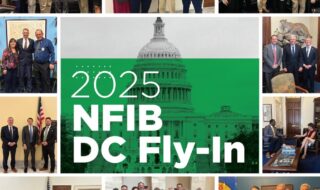March 6, 2024 Last Edit: December 5, 2024
NFIB released its Top 10 Policy Priorities for 2024 to outline key legislative issues that will impact small businesses nationwide in the coming year.
Small businesses continue to deal with inflation and workforce shortages, but there are some key policy issues that could help reduce burdens elsewhere for Main Street. NFIB constantly monitors issues that are most important to small business owners and released its “Top 10 Policy Priorities for 2024.” This list outlines the key legislative issues that will impact small businesses nationwide in the coming year, from burdensome reporting requirements to detrimental tax hikes.
“Main Street businesses have faced unprecedented economic headwinds in recent years, from record-breaking inflation to a historic labor shortage,” said Jeff Brabant, NFIB Vice President of Federal Government Relations. “Despite these challenges, small business owners persist in their efforts to provide for their customers, employees, and communities. But excessive regulatory hurdles, looming tax hikes, and ever-rising operating costs threaten to make it harder than ever for small businesses to grow and thrive.”
To assist in educating lawmakers about the most pressing issues small business owners are facing daily, NFIB compiled a list of top policy priorities for 2024.
NFIB will use this list to assist in educating lawmakers about the most pressing small business issues, prioritizing advocacy efforts, and calling for action from members.
Priority 1: Make the Small Business Deduction permanent
NFIB encourages Congress to pass the Main Street Tax Certainty Act, which will make the 20% Small Business Deduction permanent. If Congress fails to act, the Small Business Deduction will expire at the end of 2025 and taxes will increase for over 30 million business owners.
Priority 2: Stop issuing unnecessary, burdensome regulations
NFIB is increasingly concerned with burdensome rulemaking coming out of the administration. Small business owners do not have dedicated employees who work on compliance matters and often handle these issues themselves.
- NFIB opposes the proposal to increase the overtime exemption threshold for managerial workers.
- NFIB supports repealing the rule that would restrict the use of independent contractors by small businesses.
- NFIB supports repealing the recently finalized joint employer rule that would take away the autonomy and independence of franchisees.
- NFIB opposes the proposal to require small businesses to report their carbon emissions to the publicly traded companies they do business with.
Priority 3: Increase competition in the credit card network marketplace and stop mega banks and credit companies from using anti-competitive practices that hurt small businesses.
Swipe fees for small businesses are commonly as high as 3-4% of every transaction. These fees are set in an anti-competitive fashion by a limited number of massive credit card companies. NFIB supports the Credit Card Competition Act because it would inject competition into the credit card network marketplace and make mega banks and credit card companies compete on pricing just like small business owners do every day.
“Now is the time for Congress to address the key issues impacting Main Street and prioritize pro-small business legislation like the Main Street Tax Certainty Act and other policies that will strengthen the small business economy,” said Brabant.
View all 10 policy priorities for 2024 and take action to support small businesses on these issues. After signing the petition, urge your Senators and Representatives to co-sponsor the Main Street Tax Certainty Act to make the 20% Small Business Deduction permanent, and share personal stories about how this deduction has helped small businesses.
NFIB is a member-driven organization advocating on behalf of small and independent businesses nationwide.
Related Articles













